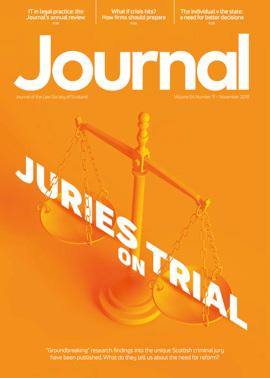Public Policy Highlights
It has been a busy month across the Society’s various policy committees, starting work on the bills for the new session at Holyrood and responding to a range of consultations and inquiries.
Law Commissions
The Society responded to significant consultations from the Law Commissions. On heritable securities, it agreed that the current legislation is somewhat outdated. As a general principle the term “standard security” should be retained unless significant changes to the law are to be made. On the scope of standard securities, it could be appropriate to include directly related liabilities. There should no longer be a statutory form of standard security.
The Child & Family Law Committee’s response on surrogacy highlighted some of the practical challenges around the current legal framework, endorsing the proposed new route that would cover most cases, and highlighted the need for more clarity around particular aspects, including the reasonable expenses that could be met.
Strategic police priorities
The Criminal Law Committee responded to the consultation on strategic police priorities. It highlighted a range of issues, including the reducing level of summary prosecutions, the increasing volume of High Court prosecutions and the nature and complexity of these cases, the importance of monitoring the impact of new domestic abuse legislation, and the treatment of vulnerable accused. For the longer term, it also highlighted the impact of technology and new investigative techniques, such as facial recognition or artificial intelligence.
Constitutional issues
Concerns were expressed on the European Union (Withdrawal Agreement) Bill that scrutiny of the bill and the Withdrawal Agreement was disproportionately inadequate, considering the importance of the complex issues contained in these documents. The bill fell at the dissolution of Parliament.
The Constitutional Law Subcommittee responded to a House of Commons committee inquiry into the scrutiny role for the UK Parliament, and devolved parliaments and legislatures, around international treaties and other instruments. It noted the ways in which the ratification of international treaties will change following the UK’s withdrawal from the European Union, and suggested that new scrutiny processes would be of benefit, improving transparency and also reflecting the increasing public interest in, for instance, trade treaties.
Responding to the International Trade Committee’s call for evidence on trade and the environment, the Trade Policy Working Group discussed concerns around the potential for “regulatory chill” as a result of investment protection clauses. It recommended that in light of the growing awareness about climate change and the need to protect the environment, “if the UK seeks to include investor protection clauses in its future trade agreements, these provisions are carefully drafted in order to ensure clarity over whether such provisions limit the UK’s ability to introduce environmental protection measures”, helping to avoid any regulatory chill or investor uncertainty that might otherwise arise. The same considerations apply to provisions that seek to promote positive environmental behaviours on the part of the UK’s trading partners.
Trade
The group also noted the potential lack of clarity around obligations created by trade agreements and international environmental agreements, where there is tension between the two. It emphasised the importance of ensuring coherence, not just across Whitehall but through engagement and cooperation with devolved administrations.
Priority areas
The Society has also been looking ahead to some of the work it aims to deliver in 2020. Three particular law reform proposals will be taken forward in greater detail. The first is around the treatment of vulnerable people in the criminal justice system, and how to achieve effective “stakeholder” communication of information for the vulnerable across the justice system. The second is around administrative justice principles, on which we have an article 'Shining a light on the state' in this edition. The third is around crofting law, where the Society will be looking at issues around croft succession, the status and definition of owner-occupier crofter, updating the statutory conditions of tenure, and definitions of crofting community.
Views are welcome around any of the Society’s work, particularly these three priorities. For more information visit the Research and Policy section, or email policy@lawscot.org.uk
The Policy team can be contacted on any of the matters above at policy@lawscot.org.uk Twitter: @lawscot.






